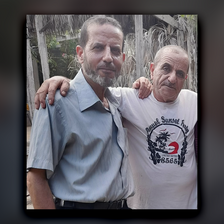The Electronic Intifada 6 May 2024

Preparing for a funeral in Deir al-Balah, central Gaza.
APA imagesMy best friend Zainab Fayyad had her life turned upside down soon after Israel launched its genocidal war against Gaza.
In October, Zainab and her family were given a warning just 20 minutes before Israel bombed al-Aklouk Tower, where they lived, in Gaza City’s al-Rimal neighborhood. They did not have time to gather any belongings apart from essential documents.
Zainab’s family were displaced a number of times before they rented an apartment.
Her father’s health is deteriorating and the family have access to very little food.
After several months, Zainab was finally able to visit what remains of her old home.
She found some of her old clothes and other belongings in the rubble. Despite the horrible circumstances, that gave her a little happiness as it brought back memories of far better times.
Zainab is a translator and a teacher of English. She is fascinated by the endurance which Gaza’s people have demonstrated.
“I see people returning to houses after there has been an explosion near them,” she said. “The explosions caused major damage yet people are determined to make their homes livable again. They pick up broken glass, fix doors and patch up broken windows with some plastic.”
Heartbroken
Fariza al-Sharif was my classmate in the Islamic University of Gaza.
I was shocked and heartbroken to read a Facebook post in October announcing that Fariza had been killed by the Israeli military. She was 32.
Fariza was a talented computer programmer. She was always willing to help classmates.
Her sister Fatima, who lives in Iraq, told me that she had been chatting with her family when “suddenly I lost all contact with them.”
Israel had targeted a neighboring home in the Sheikh Radwan area of Gaza City. Fariza was killed in that attack along with her nephews Ibrahim and Fadi, 19 and 6 years old, respectively, and her niece Huda, 12.
Fariza had plans. With Fatima’s help, she had been preparing to undertake further studies in Egypt.
“I wish that I could turn back time and hug my sister,” Fatima said. “It feels like my life has come to a standstill since that tragic moment [when Fariza was killed].”
Fear
My own direct experiences of this war have been horrible, too.
We were displaced in the early stages of this war.
For the first two months, I wanted to go back home so badly. I wanted to feel safe again.
The fear that I may die at any moment has never left me.
On 20 December, I learned that my home had been destroyed. At first I did not believe that news.
Then I cried my eyes out. I cried for all the memories and dreams that had been shattered.
My children saw me crying. So they started crying too.
During the war, I and my husband’s family moved to Deir al-Balah in central Gaza.
This meant that 10 adults and 25 children had to share a house with three bedrooms and two bathrooms.
I woke up many times to the sound of my kids weeping. They kept telling me that they missed our home.
On many occasions, I tried to visit the sea. But all I saw around me was destruction, killing, pain and despair.
I couldn’t explain to my kids that they no longer had a home in which to live.
I could not tell them that they no longer had a room in which to play.
I could not tell them that their toys, clothes, beds and books had been destroyed.
I could not tell them that we would never be able to climb our stairs hand in hand again.
We have lost everything. We have even lost the ability to fulfill our children’s needs.
When my son saw a picture of apples and bananas, he asked me to get some for him. My inability to do so broke my heart.
My daughter had an accident while playing in the street. I had to take her to hospital as she had a head injury.
The scene at the hospital was distressing. It was full of injured people and doctors and nurses who were running.
Many patients no longer had legs.
My daughter was shocked by what she saw.
When we got back to where we are now living, I tucked my daughter into bed. And I thought about how she deserves a better life than the one she has.
All I want is for this nightmare to end.
The author is a writer and translator from Gaza.





